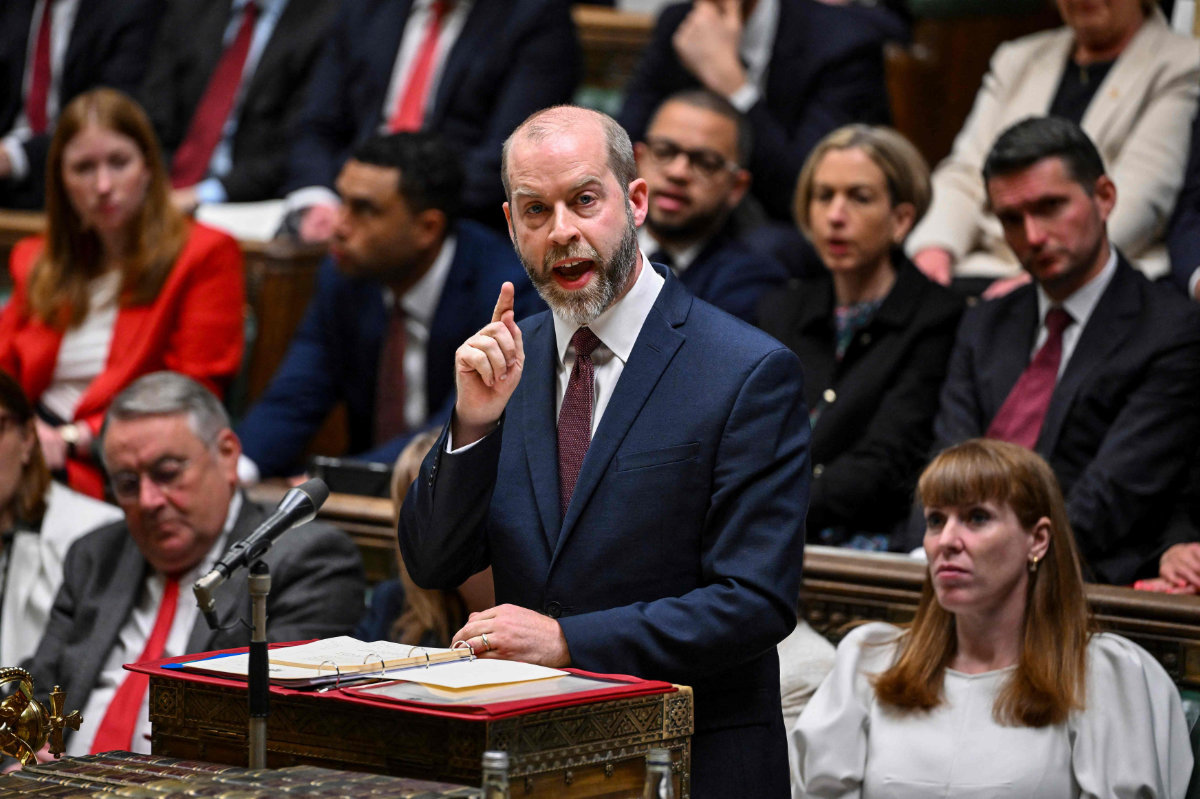LONDON : The UK government said it was taking control of Chinese-owned British Steel on Saturday after rushing an emergency law through parliament to avert the shutdown of the country’s last factory that can make steel from scratch.
The struggling plant in northern England had faced imminent closure and Prime Minister Keir Starmer said his government “stepped in to save British Steel” with legislation to prevent its blast furnaces going out.
At a rare weekend session, parliament approved the law without opposition to take over the running of the Scunthorpe site, which employs several thousand people and produces steel crucial for UK industries including construction and rail transport.
The government saw its possible closure as a risk to Britain’s long-term economic security, given the decline of the UK’s once robust steel industry.

Prime Minister Keir Starmer speaks during a visit to meet British Steel workers in Appleby Village Hall near Scunthorpe, Lincolnshire, UK, on April 12, 2025. (Pool via REUTERS)
Officials were poised to take over the site after the emergency bill passed into law on Saturday evening, according to UK media reports.
Following its approval Starmer said his administration was “turning the page on a decade of decline” and “acting to protect the jobs of thousands of workers.”
He insisted “all options are on the table to secure the future of the industry,” after a government minister indicated nationalization could be a likely next step.
Earlier, as MPs debated in parliament, the prime minister made a dash to the region where he told steelworkers gathered in a nearby village hall that the measure was “in the national interest.”
He said the “pretty unprecedented” move meant the government could secure “a future for steel” in Britain.
“The most important thing is we’ve got control of the site, we can make the decisions about what happens, and that means that those blast furnaces will stay on,” he said.
It came after protests at the plant and reports that workers had stopped executives from the company’s Chinese owners Jingye accessing key areas of the steelworks on Saturday morning.
The Times newspaper said British Steel workers had seen off a “delegation of Chinese executives” trying to enter critical parts of the works.
Police said officers attended the scene “following a suspected breach of the peace,” but no arrests were made.
State ownership considered
Facing questions about nationalization in parliament, business and trade secretary Jonathan Reynolds said state ownership “remains on the table” and may be the “likely option.”
But he said the scope of Saturday’s legislation was more limited — it “does not transfer ownership to the government,” he explained, saying this would have to be dealt with at a later stage.
Ministers have said no private company has been willing to invest in the plant.

Jonathan Reynolds, Britain's secretary for business, energy and industrial strategy, speaking during a special Parliament session called to pass emergency legislation to save the British Steel company from closing down. (House of Commons handout photo / AFP)
The Chinese owners have said it is no longer financially viable to run the two furnaces at the site, where up to 2,700 jobs have been at risk.
Jingye bought British Steel in 2020 and says it has invested more than £1.2 billion ($1.5 billion) to maintain operations but is losing around £700,000 a day.
Reynolds said “the effective market value of this company is zero,” and that Jingye had wanted to maintain the operation in the UK but supply it with slab steel from China to keep it going.
The Labour government came under fire from the opposition Conservative party for its handling of the negotiations and faced calls from some left-wing politicians to fully nationalize the plant, while unions also urged the government to go further.
Reynolds explained the government had sought to buy raw materials to keep the furnaces running with “no losses whatsoever for Jingye,” but met with resistance.
Instead Jingye demanded the UK “transfer hundreds of millions of pounds to them, without any conditions to stop that money and potentially other assets being immediately transferred to China,” he said. “They also refused a condition to keep the blast furnaces maintained.”
Saturday’s legislation allowed for criminal sanctions and gave the government powers to take over assets if executives fail to comply with instructions to keep the blast furnaces open.
Trump tariffs partly to blame
MPs had left for their Easter holidays on Tuesday and had not been due to return to parliament until April 22 when the rare session was called.
MPs last sat on a Saturday recall of parliament at the start of the Falklands War between Britain and Argentina in 1982.
Scunthorpe in northern England hosts Britain’s last virgin steel plant — which produces steel from raw rather than recycled materials — after Indian firm Tata’s Port Talbot site shuttered its blast furnace last year.
British Steel has said US President Donald Trump’s recent tariffs on the sector were partly to blame for the Scunthorpe plant’s difficulties.
However, fierce competition from cheaper Asian steel has heaped pressure on Europe’s beleaguered industry in recent years.
British Steel has its roots as far back as the Industrial Revolution but took shape in 1967 when the Labour government nationalized the industry, which at the time employed nearly 270,000 people.































